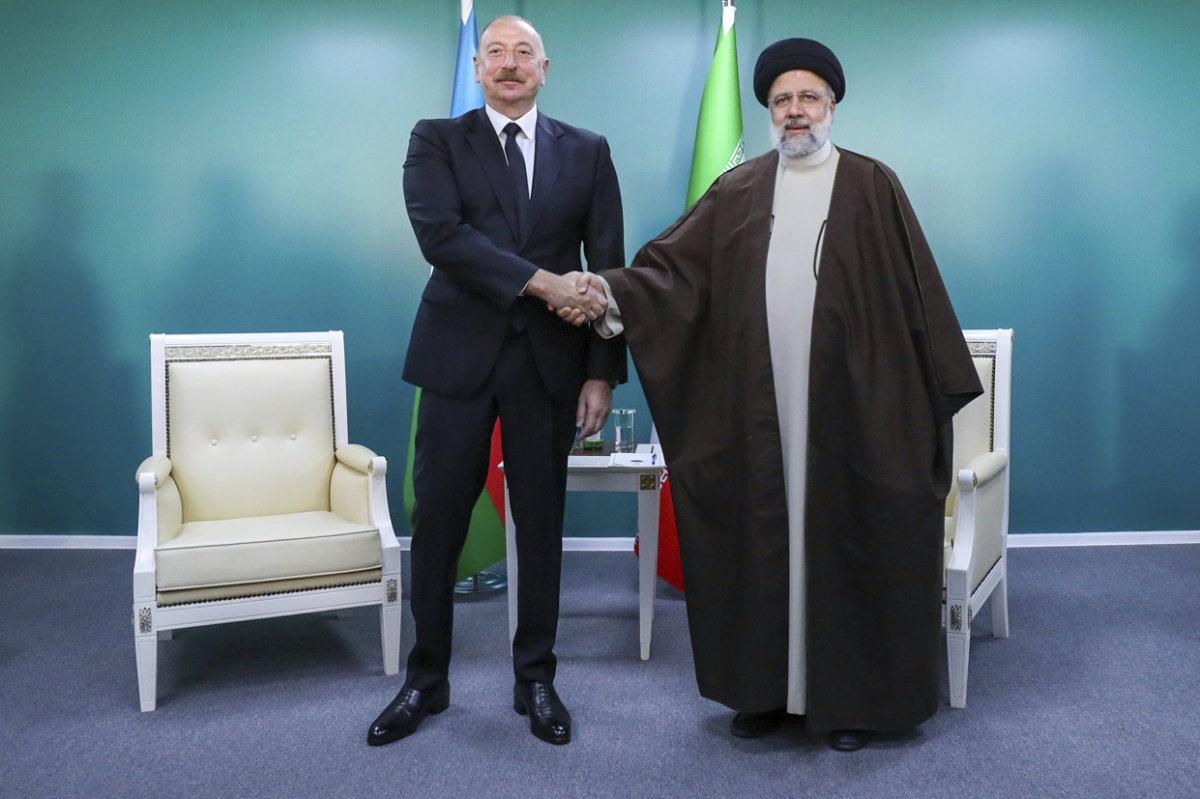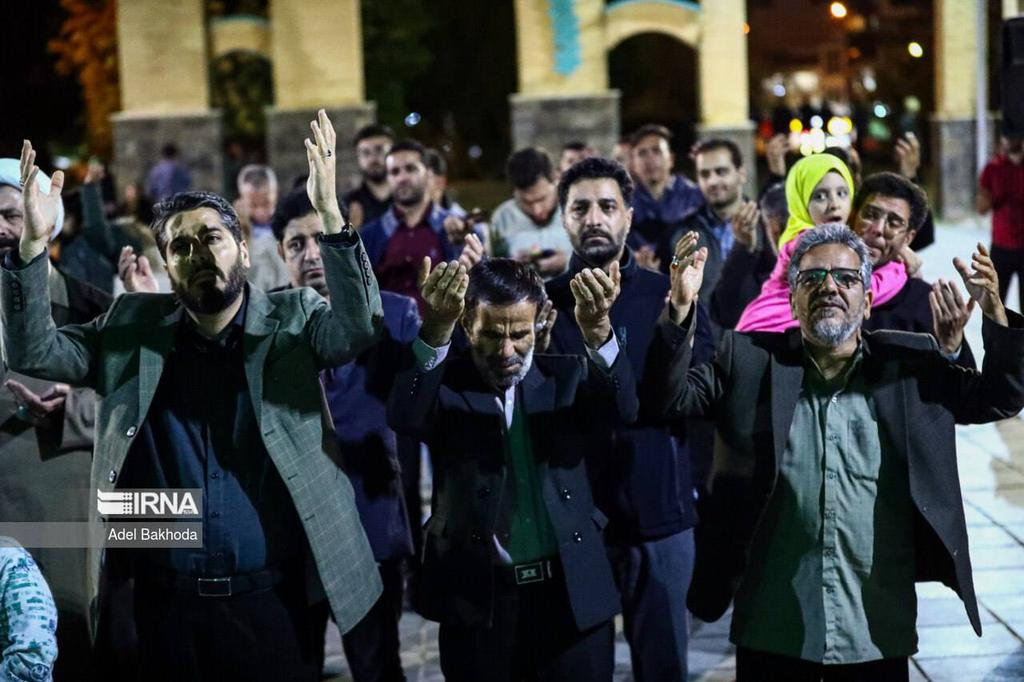DUBAI/TEHRAN: Iran’s supreme leader Ayatollah Ali Khamenei announced on Monday five days of mourning for President Ebrahim Raisi who died in a helicopter crash.
“I announce five days of public mourning and offer my condolences to the dear people of Iran,” said Khamenei in an official statement a day after the death of Raisi and other officials in the crash in East Azerbaijan province.
Khamenei has appointed First Vice President Mohammad Mokhber acting president and has a maximum period of 50 days to hold elections following the death of Raisi, Iran’s official news agency IRNA reported.
Raisi, the country’s foreign minister Hossein Amirabdollahian and others have been found dead at the site of a helicopter crash Monday after an hourslong search through a foggy, mountainous region of the country’s northwest, state media reported. Raisi was 63.
The government cabinet has appointed Deputy Foreign Minister Ali Bagheri Kani as acting foreign minister.
Lebanon and Syria on Monday announced three days of national mourning for the Iranian president and foreign minister, who were killed in a helicopter crash overnight near the Azerbaijan border.
Iran enjoys sway in both countries, backing the Lebanese armed group Hezbollah in Lebanon and supporting Syria’s government and security forces stay in power throughout more than a decade of war.
“I can’t tell you how sorry I am about this incident that happened. Especially that the foreign minister had become a friend,” Lebanon’s Foreign Minister Abdallah Bou Habib told reporters on Monday.

Rescue team works following a crash of a helicopter carrying Iran's President Ebrahim Raisi, in Varzaqan, East Azerbaijan Province, Iran, on May 19, 2024. (West Asia News Agency via Reuters)
The helicopter also carried the governor of Iran’s East Azerbaijan province, other officials and bodyguards, the state-run IRNA news agency reported.
Early Monday morning, Turkish authorities released what they described as drone footage showing what appeared to be a fire in the wilderness that they “suspected to be wreckage of helicopter.” The coordinates listed in the footage put the fire some 20 kilometers (12 miles) south of the Azerbaijan-Iranian border on the side of a steep mountain.

In this photo released by the Iranian Presidency Office, President Ebrahim Raisi, right, shakes hands with his Azeri counterpart Ilham Aliyev during their meeting in the inauguration ceremony of dam of Qiz Qalasi, or Castel of Girl in Azeri, at the border of Iran and Azerbaijan, on May 19, 2024. (Iranian Presidency Office via AP)
Footage released by the IRNA early Monday showed what the agency described as the crash site, across a steep valley in a green mountain range. Soldiers speaking in the local Azeri language said: “There it is, we found it.”
Condolences started pouring in from neighbors and allies after Iran confirmed there were no survivors from the crash. Pakistan announced a day of mourning and Indian Prime Minister Narendra Modi said in a post on X that his country “stands with Iran in this time of sorrow.” Leaders of Egypt and Jordan also offered condolences, as did Syrian President Bashar Assad.
Azerbaijan’s President Ilham Aliyev said he and his government were “deeply shocked” — Raisi was returning on Sunday after traveling to Iran’s border with Azerbaijan to inaugurate a dam with Aliyev when the crash happened.

In this photo posted on social media by the Iran News Agency, a group of people from Hamadan, western Iran are seen praying for the health of President Raisi and his accompanying delegation. (X: @IrnaEnglish)
Turkish President Recep Tayyip Erdogan conveyed his condolences. Russian President Vladimir Putin, in a statement released by the Kremlin, described Raisi “as a true friend of Russia.”
Khamenei, who had himself urged the public to pray Sunday night, stressed the business of Iran’s government would continue no matter what.
SPOTLIGHT
Under the Iranian constitution, Iran’s vice first president takes over if the president dies, with Khamenei’s assent, and a new presidential election would be called within 50 days.
First Vice President Mokhber already had begun receiving calls from officials and foreign governments in Raisi’s absence, state media reported. An emergency meeting of Iran’s Cabinet was held as state media made the announcement Monday morning. The Cabinet issued a statement afterward pledging it would follow Raisi’s path and that “with the help of God and the people, there will be no problem with management of the country.”

A handout picture provided by the office of Iran's Supreme Leader Ayatollah Ali Khamenei on May 19, 2024, shows him speaking during meeting of members of the Revolutionary Guards in Tehran. (AFP)
A hard-liner who formerly led the country’s judiciary, Raisi was viewed as a protégé of Khamenei and some analysts had suggested he could replace the 85-year-old leader after Khamenei’s death or resignation.
With Raisi’s death, the only other person so far suggested has been Mojtaba Khameini, the 55-year-old son to the supreme leader. However, some have raised concerns over the position being taken only for the third time since 1979 to a family member, particularly after the Islamic Revolution overthrew the hereditary Pahlavi monarchy of the shah.

People follow the news of a crash of a helicopter carrying Iran's President Ebrahim Raisi on a TV in a shop in Tehran on May 19, 2024. (West Asia News Agency via Reuters)
Raisi won Iran’s 2021 presidential election, a vote that saw the lowest turnout in the Islamic Republic’s history. Raisi is sanctioned by the US in part over his involvement in the mass execution of thousands of political prisoners in 1988 at the end of the bloody Iran-Iraq war.
Under Raisi, Iran now enriches uranium at nearly weapons-grade levels and hampers international inspections. Iran has armed Russia in its war on Ukraine, as well as launched a massive drone-and-missile attack on Israel amid its war against Hamas in the Gaza Strip. It also has continued arming proxy groups in the Mideast, like Yemen’s Houthi rebels and Lebanon’s Hezbollah.
Meanwhile, mass protests in the country have raged for years. The most recent involved the 2022 death of Mahsa Amini, a woman who had been earlier detained over allegedly not wearing a hijab, or headscarf, to the liking of authorities. The monthslong security crackdown that followed the demonstrations killed more than 500 people and saw over 22,000 detained.
In March, a United Nations investigative panel found that Iran was responsible for the “physical violence” that led to Amini’s death.
Raisi is the second Iranian president to die in office. In 1981, a bomb blast killed President Mohammad Ali Rajai in the chaotic days after the country’s Islamic Revolution.





























